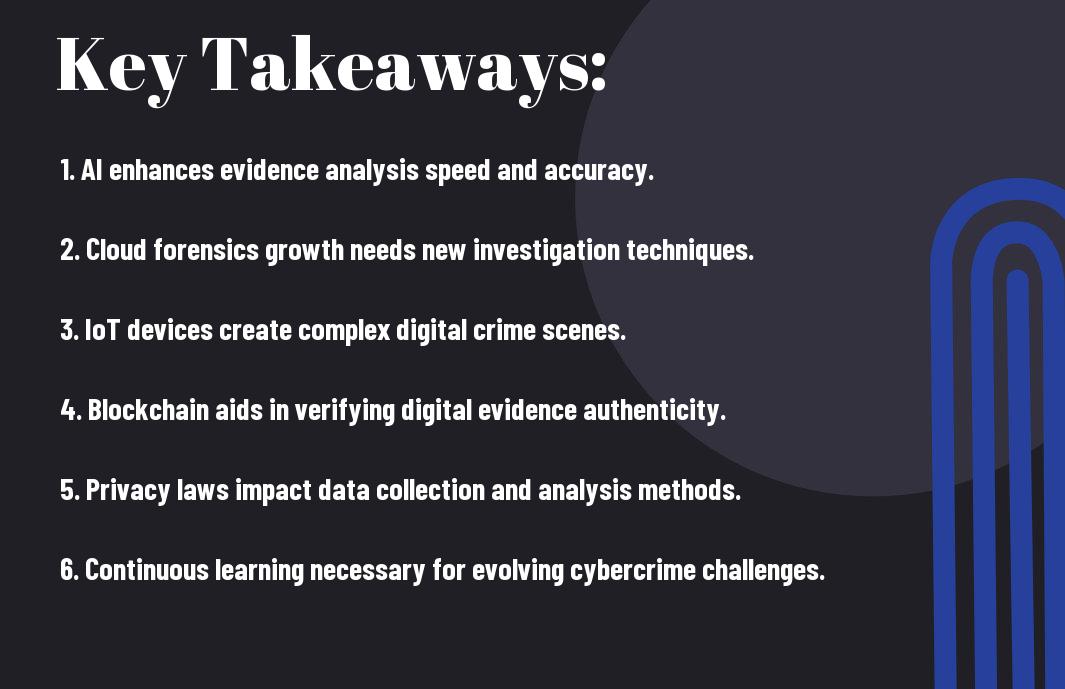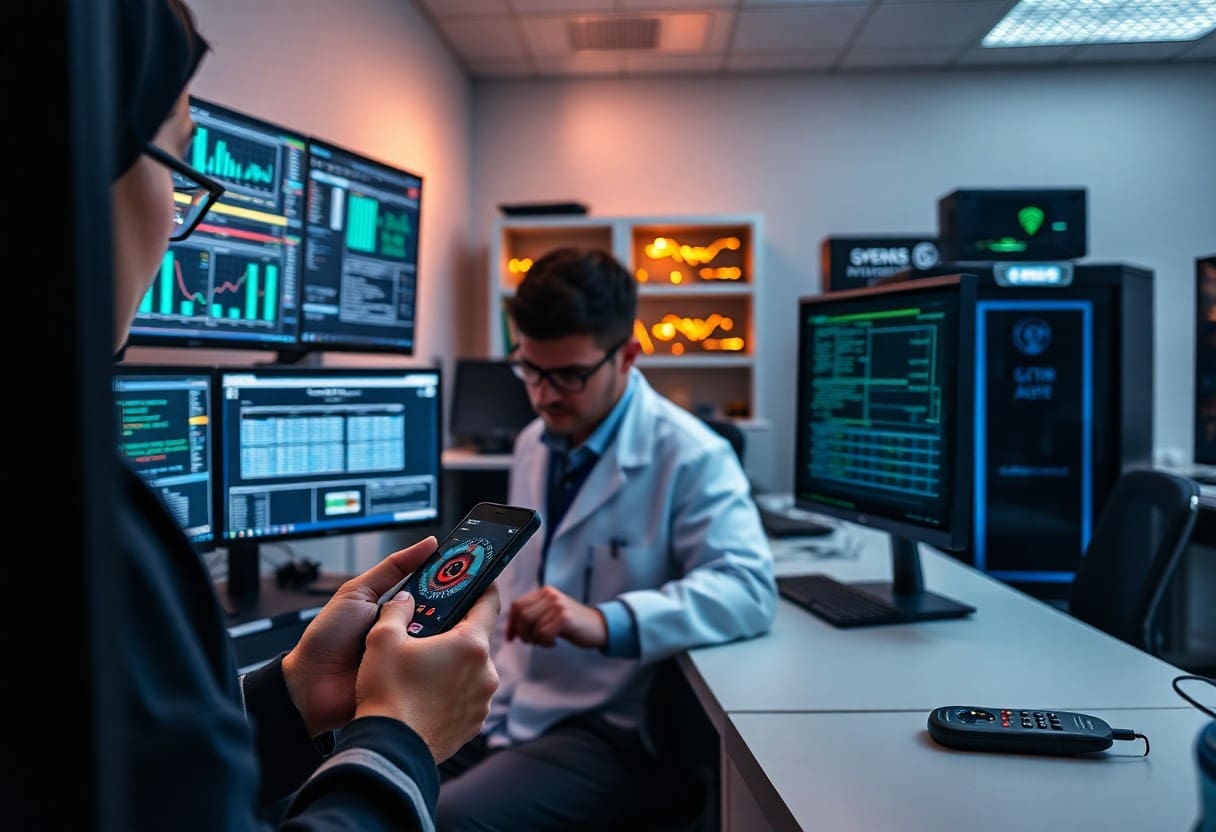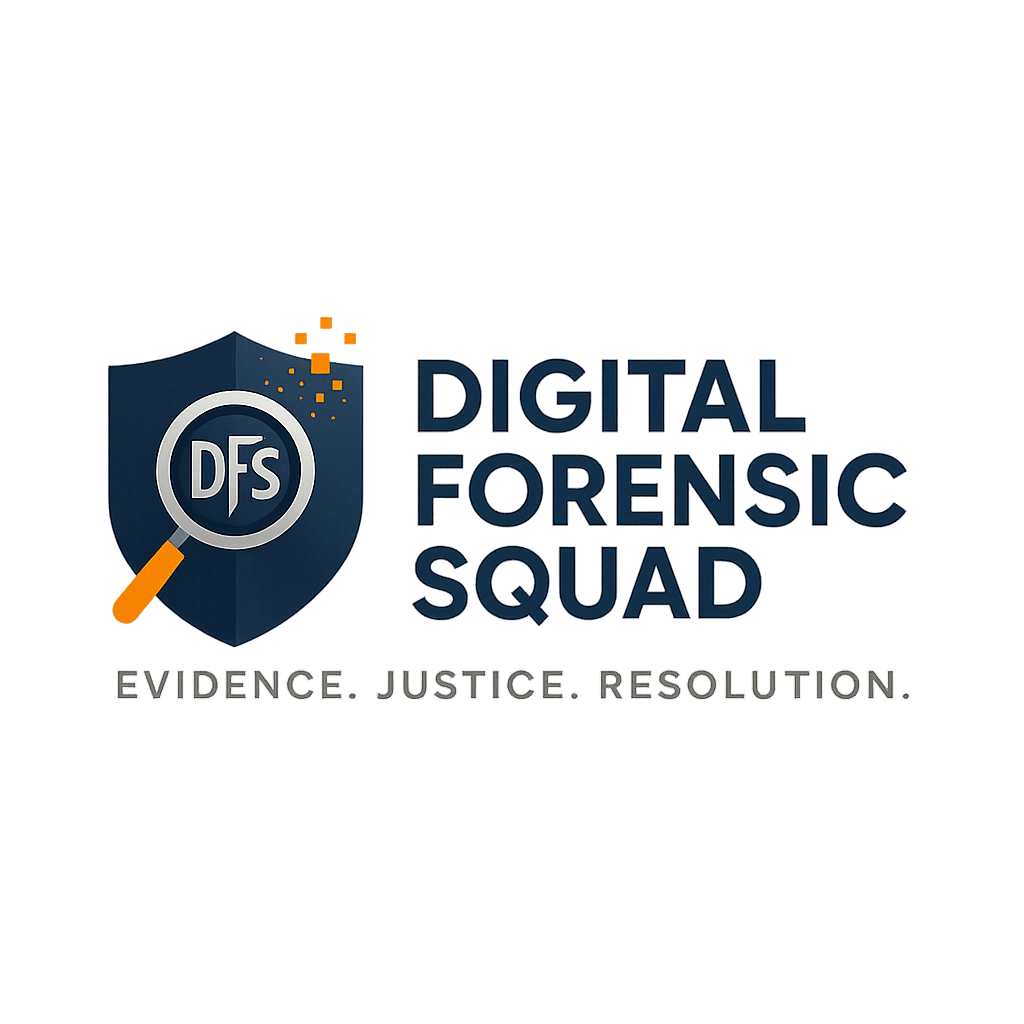Trends in digital forensics are evolving rapidly, reshaping how you protect your sensitive data and combat cybercrime. As you explore into this dynamic field, you’ll find that artificial intelligence and blockchain technology are at the forefront of innovation, enhancing investigation accuracy and data integrity. Staying informed about these advancements is crucial, as they not only improve your skills but also help you navigate the emerging threats in cybersecurity. Understanding these shifts will empower you to better secure your digital environment and respond to challenges effectively. Visit Digital Forensic Squad to learn more about applications of digital forensics.
Key Takeaways:
- Advancements in artificial intelligence and machine learning are transforming digital forensics by improving data analysis, evidence retrieval, and anomaly detection.
- Cloud computing is becoming a vital aspect of digital forensics, requiring professionals to develop new strategies for handling and securing data in distributed environments.
- As the Internet of Things (IoT) grows, forensics will need to adapt to secure and analyze an increasing variety of connected devices and the unique challenges they present.
Understanding Digital Forensics
A comprehensive understanding of digital forensics lays the foundation for navigating this evolving field. Digital forensics involves the identification, preservation, analysis, and presentation of data, particularly when it pertains to crimes and misconduct involving digital technologies. As technology expands, grasping the principles and practices of digital forensics becomes indispensable for detecting and resolving cybercrimes effectively.
Definition and Importance
Against the backdrop of increasing cyber threats, digital forensics has emerged as a critical discipline. It empowers you to uncover evidence, support legal proceedings, and protect your organization’s digital assets. Its significance cannot be overstated; in a world dependent on information technology, mastering digital forensics is key to defending against digital misdeeds.
Key Components and Tools
Around the landscape of digital forensics exist various key components and advanced tools necessary for effective investigations. You will encounter both hardware and software solutions that aid in data recovery, analysis, and reporting. Familiarizing yourself with tools like EnCase, FTK, and Autopsy will enhance your ability to interpret digital evidence accurately.
And as you explore these tools, it becomes evident that they provide crucial resources for forensic investigators. Each tool offers unique functionalities, such as disk imaging, data carving, and files recovery, enabling you to collect and preserve evidence while minimizing data loss. Furthermore, understanding the chain of custody is vital to ensure the integrity of your findings during legal scrutiny. By leveraging these sophisticated tools, you position yourself to tackle digital challenges effectively and responsibly.

Emerging Trends in Digital Forensics
Some of the most significant trends shaping the field of digital forensics include advancements in technology that enhance your investigative capabilities. The future landscape is being influenced by various innovations, including those detailed in this article on Technology Trends Shaping the Future of Forensics Industry. Keeping an eye on these developments is vital for staying ahead in the field.
Artificial Intelligence and Machine Learning
Emerging technologies, such as artificial intelligence (AI) and machine learning, are transforming digital forensics. They enable you to analyze vast amounts of data quickly and accurately, detecting patterns that would be impossible to identify manually. By leveraging these tools, you enhance your ability to conduct effective investigations while minimizing human error.
Cloud Forensics
Digital forensics has expanded into cloud environments, making cloud forensics an vital skill for you as a forensic investigator. The challenges associated with retrieving and analyzing data from cloud services require specialized techniques to ensure that evidence is preserved and analyzed effectively.
In addition, cloud forensics presents both opportunities and risks; it allows you to access vast storage resources but requires you to navigate complex legal and ethical considerations. Understanding the dynamic nature of cloud services is imperative as data can be stored across multiple jurisdictions, complicating your investigations. Moreover, security vulnerabilities and privacy concerns in cloud environments can expose organizations to significant risks, highlighting the need for comprehensive forensic strategies that protect both evidence integrity and stakeholder interests.
Innovations in Digital Evidence Collection
Now more than ever, the landscape of digital evidence collection is evolving at a rapid pace. Innovations in technology and methodologies are enhancing the ability to gather and analyze data from various sources. As a beginner in the field, staying updated on these advancements is vital. They not only improve the efficiency of investigations but also ensure that you can adapt to the ever-changing nature of digital threats.
Mobile Device Forensics
With the majority of your interactions occurring on mobile devices, mobile forensics has become a key area in digital evidence collection. You need to know that the latest tools can recover data from smartphones, including messages, call logs, and even deleted files. This capability allows you to retrieve vital evidence that may otherwise be lost, making mobile device forensics an indispensable skill in your toolkit.
Internet of Things (IoT) Forensics
Evidence from IoT devices, such as smart cameras, home assistants, and wearable tech, is increasingly significant in investigations. You’ll find that these devices often hold valuable data points, including user behavior patterns and location tracking info. This information can help you identify relationships and establish timelines in various cases.
Also, IoT forensics presents unique challenges due to the sheer volume of data and the diversity of devices involved. You should be aware that many IoT devices have inadequate security measures, making them susceptible to manipulation and data breaches. As a digital forensics professional, your ability to navigate these complexities will greatly enhance your investigative prowess, enabling you to extract crucial evidence that can significantly impact your case outcomes.
Legal and Ethical Considerations
Many individuals venturing into digital forensics face an evolving landscape of legal and ethical considerations. As technology advances, you must navigate complex regulations and ethical dilemmas that arise when handling personal data. Understanding the implications of your actions not only protects your integrity but also influences the outcomes of investigations in which you may be involved.
Privacy Implications
To ensure the protection of individuals’ rights, it’s imperative to balance investigative needs with privacy concerns. You should be aware that improperly accessing or disclosing private data can have serious repercussions, both legally and ethically. Striking this balance requires a solid understanding of the legislation surrounding privacy in your region.
Legal Framework and Challenges
Across jurisdictions, the legal framework surrounding digital forensics presents unique challenges that you must comprehend thoroughly. Digital evidence often crosses borders, complicating legal proceedings and prompting questions about jurisdiction. Moreover, you need to keep abreast of continually evolving laws, including data protection statutes, which can introduce additional requirements in your forensic processes.
Privacy is a fundamental issue in digital forensics, and it is vital for you to ensure compliance with applicable regulations while conducting investigations. The laws governing data ownership and privacy often vary between regions, which may create legal grey areas. Consequently, your understanding of international treaties and local legislation is imperative to avoid potential legal pitfalls. Awareness of these complexities not only enhances your ability to perform effectively but also fosters trust in your forensic findings, ultimately aiding both your professional growth and the integrity of the digital forensics field.
Future Career Opportunities in Digital Forensics
After exploring the growing domain of digital forensics, you’ll discover numerous career opportunities on the horizon. As technology evolves, so do the roles within cybersecurity. Positions ranging from forensic analysts to digital investigation specialists will be in high demand. To stay ahead, consider delving into The Future of Digital Forensics: Trends and Emerging … to better understand the skills you should prioritize to secure your future in this field.
Skills and Qualifications
Forensics professionals must equip themselves with a solid foundation in technology and analytical skills. This includes proficiency in various software tools, an understanding of legal regulations, and the ability to think critically under pressure. Continuous learning and certification in digital forensics will significantly enhance your qualifications and set you apart in this competitive landscape.
Job Market Trends
Skills in digital forensics are increasingly sought after as organizations face escalating cyber threats. You should focus on keeping your skill set updated to align with evolving technologies. The demand for skilled professionals is projected to grow substantially as businesses recognize the need for effective, proactive cybersecurity measures. This trend indicates a promising job market where your expertise will be highly valued.
Career opportunities in the digital forensics field are expanding, driven by the growing necessity for data protection and the investigation of cybercrimes. You will find that organizations across various sectors—government, finance, healthcare—are investing significantly in cybersecurity, which leads to a greater influx of job openings. Embracing a proactive approach to learning and staying informed about the latest digital threats will place you in a favorable position as the industry continues to evolve rapidly.
Resources for Beginners in Digital Forensics
Your journey into digital forensics can be greatly enhanced with the right resources. Numerous platforms offer a wealth of knowledge, from online courses and certifications to insightful books and journals. Utilizing these tools will not only provide a solid foundation in the field but also equip you with the skills needed to tackle real-world challenges in digital investigations.
Online Courses and Certifications
Below are some excellent online courses and certifications available for aspiring digital forensics professionals. Platforms like Coursera, Udacity, and Cybrary offer structured courses that cover crucial topics such as data recovery, incident response, and the legal aspects of digital forensics. Earning certifications such as Certified Computer Forensics Technician (CCFT) or EnCase Certified Examiner (EnCE) can also enhance your credibility and open doors within the industry.
Recommended Books and Journals
One effective way to deepen your knowledge in digital forensics is through recommended books and journals. These resources provide comprehensive insights and case studies that will strengthen your expertise in various digital forensic methodologies and tools.
Indeed, books like “Digital Forensics for Dummies” and “The Digital Forensics Handbook” serve as excellent starting points, offering foundational knowledge and practical tips. Also, journals such as the Journal of Digital Forensics, Security and Law and Digital Investigation provide access to cutting-edge research and case studies, keeping you informed about the latest trends and techniques in the field. Investing time in these resources will significantly enhance your understanding and prepare you for future challenges in digital forensics. Visit Digital Forensic Squad regularly to learn more about applications of digital forensics.
Final Words
Summing up, as you probe into the future of digital forensics, it’s imperative to stay informed about emerging trends and innovations that can enhance your skills and knowledge. By embracing advancements in artificial intelligence, cloud computing, and data privacy measures, you position yourself to address the evolving challenges in this field effectively. Equip yourself with the latest tools and techniques, and foster a mindset geared towards continuous learning. As digital landscapes change, your adaptability and dedication will be key to navigating this exciting and dynamic profession.
Q: What are some key trends in digital forensics that beginners should be aware of?
A: There are several significant trends shaping the field of digital forensics. Firstly, the increasing complexity of technology, including cloud computing and IoT (Internet of Things) devices, has necessitated the development of more sophisticated forensic tools and techniques. Secondly, the rise of artificial intelligence (AI) and machine learning is transforming the way investigators process and analyze large volumes of digital data. These technologies help in identifying patterns and anomalies more efficiently. Lastly, the focus on privacy and data protection laws, such as GDPR, is prompting digital forensics professionals to adapt their practices to ensure compliance while conducting investigations.
Q: What skills would be beneficial for beginners who want to pursue a career in digital forensics?
A: Beginners looking to enter the field of digital forensics should develop a combination of technical and analytical skills. Familiarity with operating systems, programming languages, and cybersecurity principles is important. Understanding how to use specialized forensic software and tools, such as EnCase or FTK, will also be advantageous. Additionally, strong analytical thinking and problem-solving abilities are important, as they allow professionals to interpret data effectively and draw conclusions that can assist in investigations. Lastly, good communication skills are vital for documenting findings and presenting them clearly in legal proceedings.



